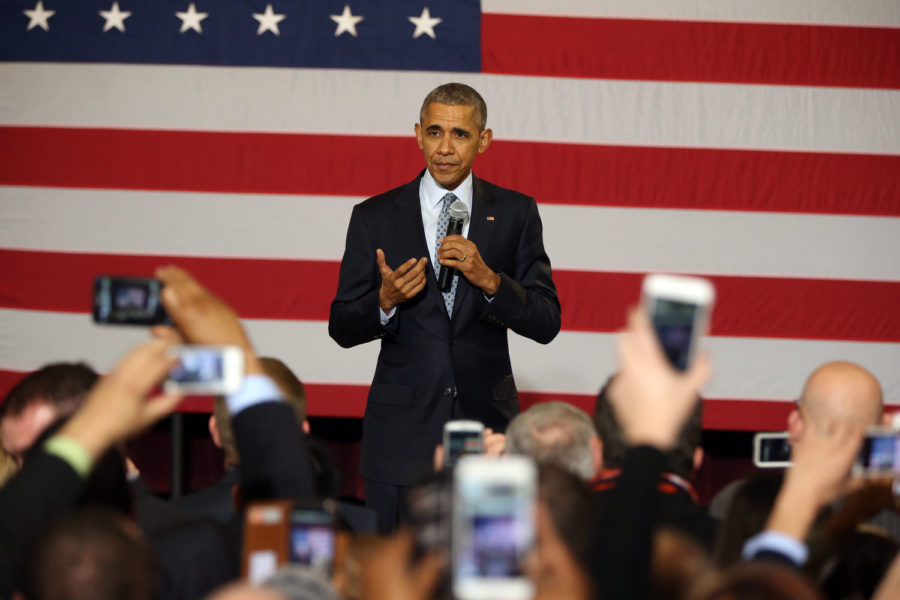Wistful Obama calls for ‘better politics’ of civility in return to Springfield
President Barack Obama stops at the Hoogland Center for the Arts in Springfield, Ill., following his speech at the Illinois State Capitol on Wednesday, Feb. 10, 2016. (TNS)
February 10, 2016
President Barack Obama on Wednesday returned to the place that launched his public career, delivering a memory-laden, valedictory-type address to Illinois lawmakers, saying they and the nation deserve “better politics” based on civility and compromise to cure a “poisonous political climate” that pushes citizens away.
Speaking for an hour at the state Capitol, where he served before becoming a U.S. senator en route to the White House, Obama criticized a political atmosphere in which adherence to hard-line ideology interferes with progress.
“The point I’m trying to make is I care about fixing our politics,” said Obama, who is in his final year as president. “The reason this is important to me is next year I’ll still hold the most important title of all, and that’s the title of citizen.”
Advertisement
The president, sometimes sounding wistful in a speech filled with reminiscences of his legislative days, made his remarks on the ninth anniversary of his announcement that he was seeking the presidency – an address that occurred just blocks away at the Old State Capitol.
While directing his remarks about political dysfunction largely at Washington, Obama did make references to Illinois’ historic stalemate that has kept the state without a budget for eight months.
The president noted his support for unions and collective bargaining to improve the middle class, earning the cheers of Democrats who are battling Republican Gov. Bruce Rauner’s efforts to push a pro-business, union-weakening agenda in exchange for a budget agreement.
More pointedly, Obama singled out Democratic state Rep. Ken Dunkin, of Chicago, who has sided with Rauner on several issues to deny House Speaker Michael Madigan a 71-vote, veto-proof majority. Dunkin is facing a primary challenge and is being backed for re-election by Rauner allies.
Obama said reaching political compromise across the aisle “doesn’t make me a sellout to my own party.” Dunkin jumped out of his chair and shouted “Yes!” before Obama verbally slammed him.
“We’ll talk later, Dunkin. Sit down,” Obama said as Democrats – and even some Republicans – erupted into wild cheers.
In reciting what he called the ills of modern politics, Obama said the problems were not that politicians were worse or that issues have become more complicated.
Advertisement*
“We’ve always gone through periods when our democracy seems stuck, and when that happens we have to find a new way of doing business. We’re in one of those moments. We have to build a better politics,” he said.
“What’s different today is the nature and extent of the polarization,” said Obama, who cited political parties that have become more homogeneous in their ideology, a fractured media, advocacy groups and “unlimited dark money.”
“So often these debates, particularly in Washington but increasingly in state legislatures, become abstractions,” Obama said. He said voters have become turned off to politics that “encourages the kind of ideological fealty that rejects any form of compromise as weakness.”
At various points in his speech, Obama observed that while Democrats were standing and applauding, Republicans largely were staying in their seats – a symbol of the political divisions rooted in Washington that were in evidence when the president delivered his State of the Union address.
“One of my few regrets is my inability to reduce the polarization and meanness in our [nation’s] politics,” he said. “I was able to be part of [reducing] that here and yet couldn’t translate it the way I wanted to into our politics in Washington.”
Obama called for efforts to reduce what he called “the corrosive influence of money in our politics,” an end to gerrymandered congressional districts and making it easier to vote. He said Illinois lawmakers should approve pending legislation to make voter registration automatic when people get their driver’s licenses.
But as he spoke in a Capitol that has become a prime example of political dysfunction, it was questionable whether Obama’s visit and rhetoric would have any effect on the tone in Springfield.
Senate Republican leader Christine Radogno, of Lemont, who Obama said he could “always trust” in their time together in the Senate, said she didn’t believe the president’s remarks were intended to scold state lawmakers.
“I think he’s felt the frustration,” Radogno said. “He’s been frustrated by the partisanship, though he’s been part of it. I’ve been frustrated, and I’ve been part of it. I think he’s asking everyone collectively to rise above that.”
Advertisement








